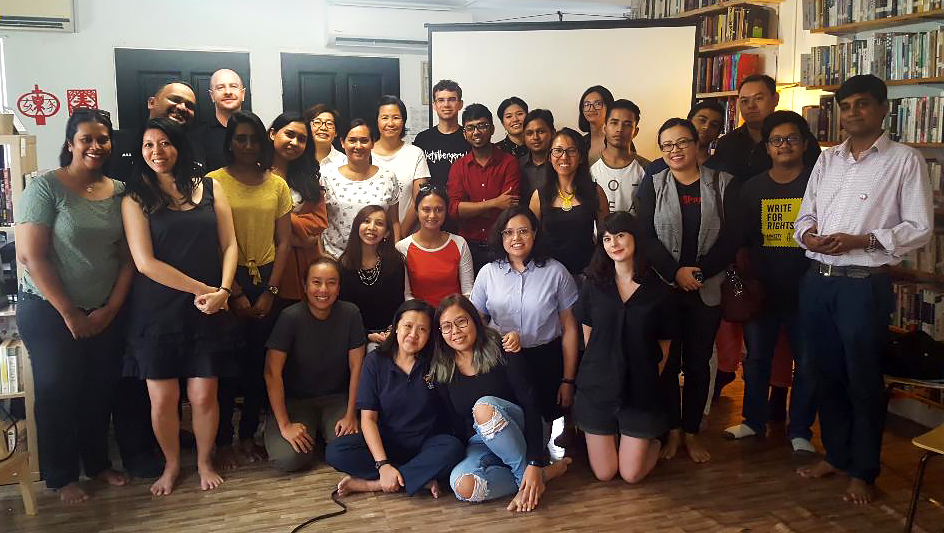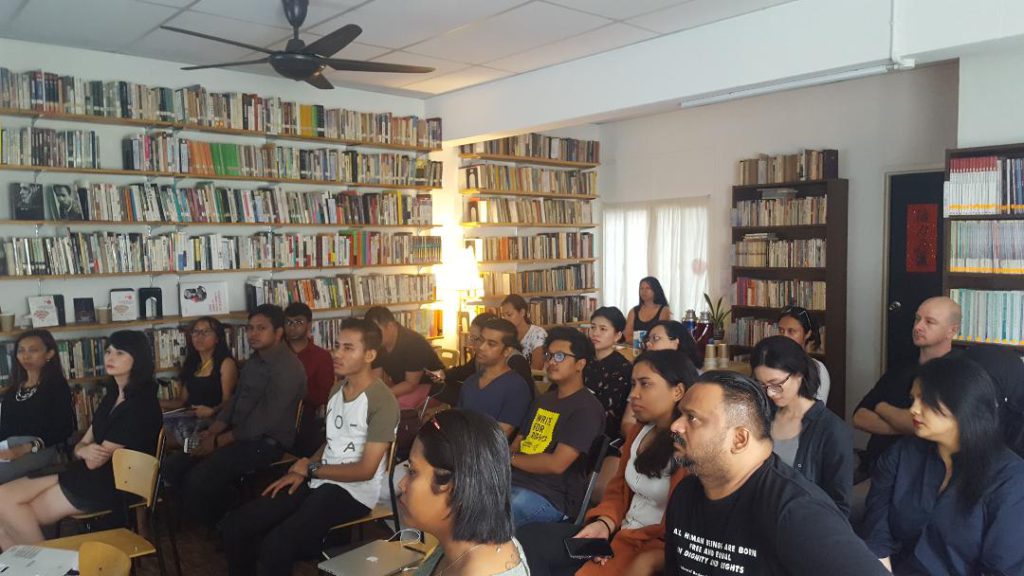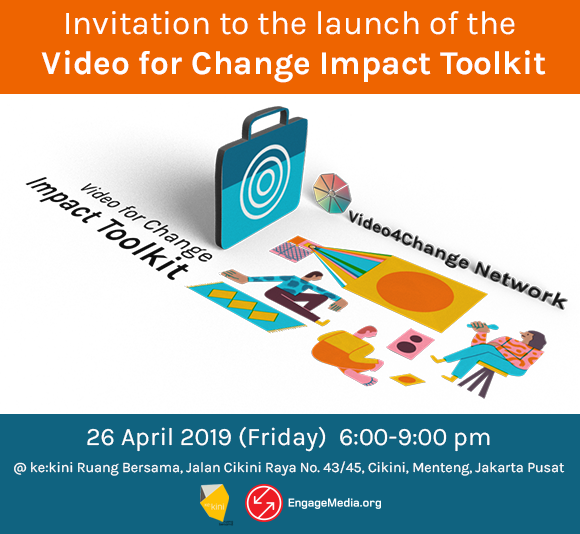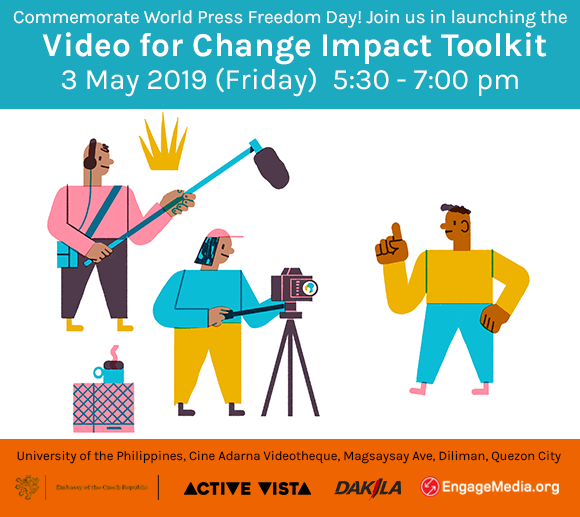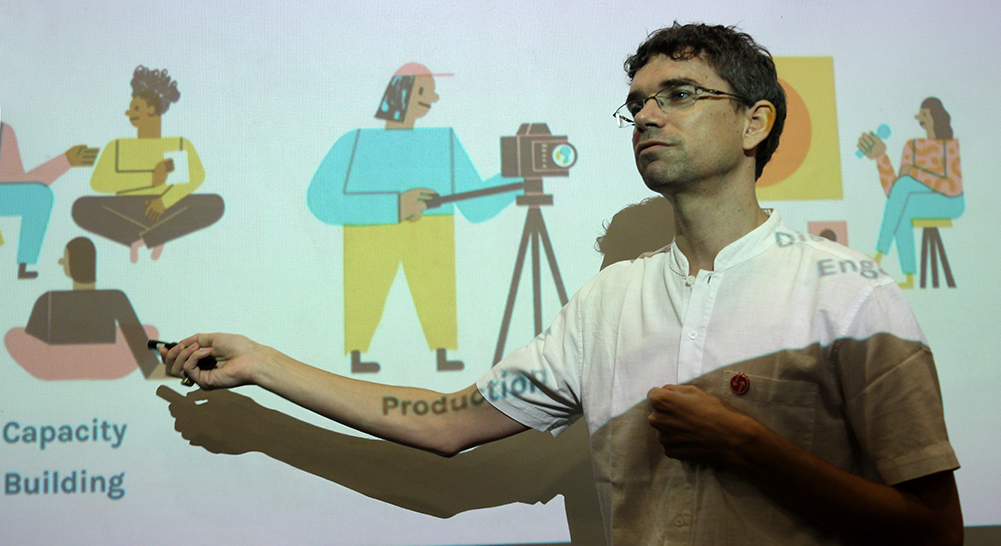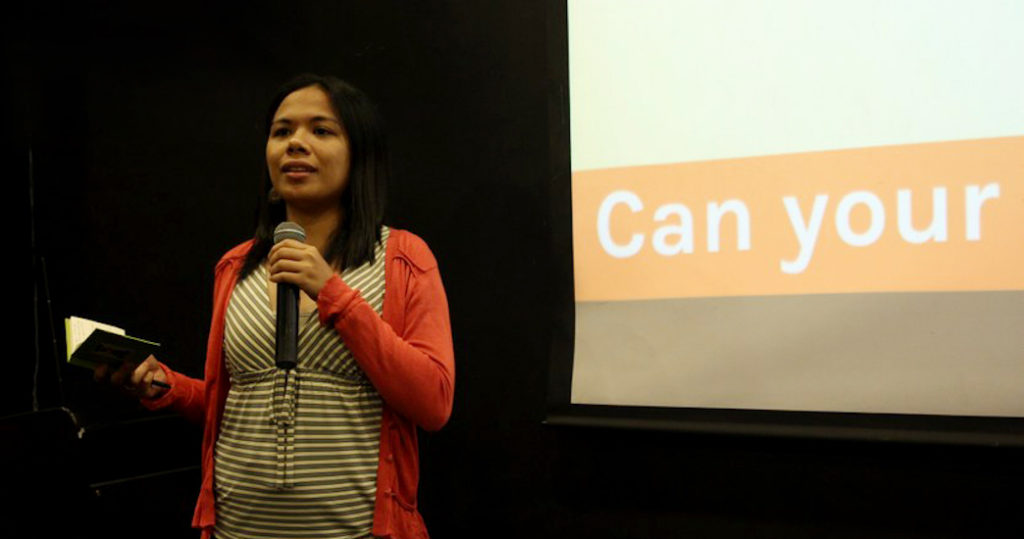Following the global online launch of the Video for Change Impact Toolkit on 24 April 2019, EngageMedia, in collaboration with various partners, organised Toolkit launches in three Southeast Asian cities. After all, nothing beats discussing and exploring the Impact Toolkit’s contents through real-life interactions with actual users and interested audiences.
We started off in Kuala Lumpur on 25 April. Fellow Video4Change network member Freedom Film Network (FFN) had invited around 35 video-makers, activists, academics and NGO workers to gather at Rumah Atap Library.
Anna Har, the director of FFN, started the afternoon by placing the Toolkit in its global context and wishing everyone an inspiring afternoon. After this, Egbert, the Video for Change Impact Coordinator, explored some of the Toolkit’s concepts and ideas. His presentation was followed by a screening of the short documentary Menunggu Masa, which advocates for the abolishment of capital punishment in Malaysia.
The makers of Menunggu Masa, Seira Sacha and Sherrie Razak Dali, were both present and highlighted the similarities between the process of making their film and the contents of the Impact Toolkit.
“We recognise a lot of the issues discussed in the Toolkit,” said Seira. “The ethical concerns Egbert discussed match our experiences in making this film.”
During a post-screening discussion, participants asked the directors about how they mitigated risks while interviewing key people involved in this sensitive case, how they managed to gain the confidence of the subjects in the film and how they managed to shoot inside the court.
Following the film discussion, participants asked further questions about how to use the Toolkit, and one film teacher even asked if he could use the Toolkit as part of his curriculum.
Egbert explained that the toolkit is best used on a needs basis, so instead of trying to read it from A to Z, readers are better off reading those sections immediately relevant to them. The toolkit is under a Creative Commons license, which means everyone is free to use and share its contents non-commercially.
After a vibrant 45 minutes of discussion, everyone agreed that the Impact Toolkit was a great reference for anyone using video to address social issues.
The discussion also raised an important point about hosting screenings with selected audiences and the high potential of creating impact. These days, we tend to focus too much on online distribution, overlooking the potential for new collaborations and the possible identification of individual agents of change that may help advance our efforts. And as we ended an inspiring afternoon, a number of participants shared examples of achieving positive outcomes after they had facilitated screenings and post-screening discussions.
The next day, Egbert headed to Jakarta, where the second launch was held at the co-working space Ke:Kini in Jakarta. He was joined by Andrew Lowenthal, executive director of EngageMedia and Enrico Aditjondro, EngageMedia board member, who all presented to an Indonesian audience of activists and film-makers.
Again the contents of the Toolkit resonated with participants. Recommendations for distribution within Indonesia and the need for an Indonesian translation of the Toolkit were followed by practical questions.
For example, Arif Supam Wijaya, from the World Resource Institute, asked how he could use video to address plastic waste issues within fishing communities living in the coastal regions of Indonesia. Egbert explained that before starting to make any video for change, you should be clear about what kind of change your video can realistically make, basically answering the question: why do you want to make a video?
The writing of an Impact Statement, which outlines the mission and vision of your initiative and communicates your impact strategy to all stakeholders, particularly the most affected, is an important step in starting a video initiative like the one Arif Supam Wijaya is planning.
Besides the discussions about the Toolkit, we also screened Love letter to a Soldier (2012) from Indonesian Video for Change initiativePapuan Voices.
Enrico, one of the producers of this video, explained some of the challenges and impacts this video has made over the years, exemplifying that the shelf-life of a video is not necessarily just the 3-6 month period after its release. A good video might well become relevant again as circumstances change.
The third launch was held on 3 May in Manila as part of Active Vista’s Film and Media Lab. This is a learning event that combines human rights expertise, film and media studies and art advocacy strategies in a series of lectures, film screenings, discussions, and working groups.
In a small cinema at the University of the Philippines Film Institute, Philippines-based EngageMedia staff members King Catoy, Dianne Olivan and Nica Dumlao, joined Egbert to talk about the Video4Change Network and to explore how to use the Impact Toolkit to enhance positive social change in the Philippines.
Around 65 young, aspiring documentary filmmakers and activists reacted enthusiastically to the concepts and ideas of the Toolkit. Most of the audience members had not heard about Video for Change before and had never considered strategising for impact before making their films.
Before we opened the floor for discussions, Ilang-Ilang Quijano, a reviewer of the Toolkit, highlighted some of most interesting topics of the Toolkit in the Philippines context. Ilang suggested the young Filipino audience look at the 10 questions to answer before filming, a resource from fellow Video4Change Network member WITNESS, which the Toolkit refers to.
Interesting discussions about audience segmentation and the best distribution and outreach campaign for a documentary film highlighted this audience’s tendency to view impact as something that occurs after a film is made. Offering them a new perspective and seeing all the slightly puzzled, yet positive faces made this third edition a success.
After the presentation, our Toolkit also received applause from Nick Danziger and Claudia Modonesi, the directors of Picture People, who acknowledged the gap the Impact Toolkit fills for those working in the Global South with limited budgets and in sometimes risky environments.
That night, the entire EngageMedia team joined the World Press Freedom Day Concert in Manila, which was co-hosted by EngageMedia. The following day Egbert joined a masterclass on Production and Distribution of Social Impact Films presented by Barbora Hudeckova of the One World International Human Rights Film Festival.
During the masterclass, he discovered that festivals like One World are also making efforts to maximise the impacts of their films beyond the regular event screenings. Of course Egbert recommended the Impact Toolkit, as it’s filled with strategies for maximising impacts during the outreach, distribution and engagement stages.
The responses and reactions during these first launches are a clear indicator of the Toolkit’s usefulness and relevance, making ongoing outreach and engagement with potential users all the more important. Are you interested in presenting the Toolkit to your community, or at your school/organisation? Feel free to send us an email.
